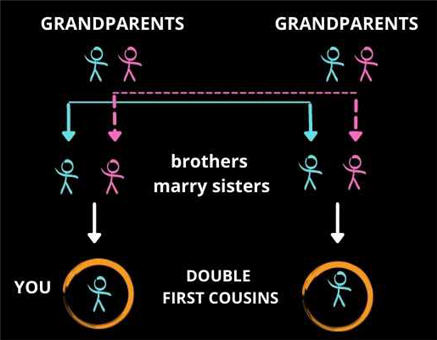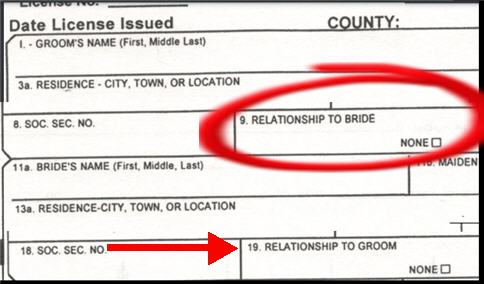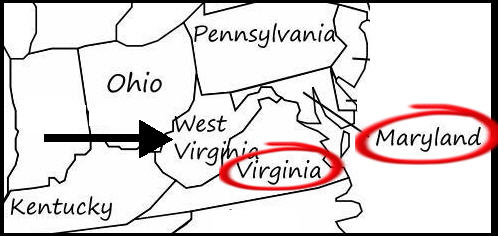It is currently illegal for first cousins to marry in West Virginia. The laws explicitly include double first cousins within the ban.
First cousins once removed and other more distant relationships are allowed to marry.
This article reviews the important aspects of cousin marriage within the Mountain State. If you’re not sure what double first cousins are, we’ll give a clear explanation.
What Do The West Virginia Marriage Laws Say About First Cousins?
The West Virginia marriage laws have a rather short list of prohibited relationships. The list for a male is repeated from the perspective of a woman.
We’ve bolded the relevant parts.
A man is prohibited from marrying his mother, grandmother, sister, daughter, granddaughter, half sister, aunt, brother’s daughter, sister’s daughter, first cousin or double cousin.
A woman is prohibited from marrying her father, grandfather, brother, son, grandson, half brother, uncle, brother’s son, sister’s son, first cousin or double cousin.
West Virginia marriage laws
There is a separate section of the code that clarifies the issue of cousins being related through adoption. It means that if your cousin relationship is through adoption, then it is permitted.
…cousin or double cousin does not include persons whose relationship is created solely by adoption.
West Virginia marriage laws
What does “double cousin” mean?
Double first cousins are much rarer than first cousins. You probably know if you qualify as one!
However, it’s important to be sure if you are getting married in the Old North State.
Basically, one of your parents is a sibling of a parent of your partner. But if that was just the case, you’d simply be first cousins.
The difference with second cousins is that your other parent is also a sibling to the other parent of your partner. So, you are first cousins through two sibling relationships.
Here’s a diagram of one scenario (there are other scenarios that also apply):

Has the ban always been in place?
When West Virginia joined the Union in 1863, there was no ban on first cousins.
In 1955, first cousins and double cousins were added to the list of prohibited relationships.
The laws were amended in 1986 to ensure that they didn’t apply to cousins who are related through adoption.
Are there any exceptions to the laws?
Some other states generally don’t allow first cousin marriage but have some allowances based on age, fertility, or other criteria.
In contrast, West Virginia has a blanket ban within the state. There are no special exceptions.

Types Of Cousins That Can Get Married In West Virginia
Relationships that are further out than first cousins are allowed.
This means that first cousins once removed can marry in the state.
Of course, more distant cousins are also permitted.
If you’re not entirely clear on the difference is between the cousin relationships, the links below will give you diagrams and clear explanations.
- first cousins once removed (children of your first cousins)
- second cousins explained (parents are first cousins)
- third cousins explained
- fourth cousins explained
Once you get past fourt cousin, it’s unlikely you’ll even know if the relationship exists between you and your spouse-to-be!
Does The West Virginia Marriage Application Form Ask If You’re Related?
We reviewed the application form for a marriage license from Felton County in 2022.
The form has a section that asks the prospective groom for his relationship with the bride. Similarly, the bride is asked about her relationship with the groom.

There is space to clarify the exact nature of the relationship e.g. second cousin.
Be prepared for questions from the official who is issuing the marriage license.
Don’t worry! Just explain clearly how you are more distant than a first cousin relationship.
Do Nearby States Allow First Cousins To Marry?
West Virginia is bordered by Kentucky, Maryland, Ohio, Pennsylvania, and Virginia. Two of these states allow first cousins to marry. Check out these articles for more details:

Looking for a destination wedding spot?
Do you live in a state or country where first cousin marriage is legal and you simply wanted to visit West Virginia as a destination wedding spot?
Consider these other states as alternative options in the region!
Looking to relocate?
Some first cousins choose to relocate permanently to a state where their marriage will be legal.
Review your options and future plans carefully. You may wish to sit down with an attorney to consider all the implications.
Some states in the U.S. will not recognize legal marriages from other states.
Roman Catholic Marriages
Even if close cousins move to another state that allows their civil marriage, they will face separate hurdles if they want a wedding in a Roman Catholic church.
Historically, the Catholic Church hasn’t encouraged first cousin marriages. However, the church laws have been relaxed somewhat in recent years.
There is a process that first cousins need to go through with the hierarchy in order to get permission to marry in a church ceremony. This is known as a dispensation.
You can read a more detailed explanation here on how first cousins can have a Catholic wedding.
What about other cousins?
Second cousins (and further out) don’t need to get special permission for a Catholic Church marriage.
We suggest that you mention to your priest that you are second cousins before the service. This means he won’t get uneasy if he hears mention of “cousins” from other people.
If you’re not sure about whether you are first or second cousins, check out our article that explains how second cousins are related to each other.
Frequently Asked Questions
Here are some quick answers to common questions.
Does West Virginia allow relatives to marry?
West Virginia does not allow close relatives to marry.
More distant relatives such as second cousins are allowed to marry in the state.
Can you marry a sibling in West Virginia?
West Virginia does not allow siblings to marry. Half-siblings are also not allowed to marry in the state.
Is it legal to marry your second cousin in West Virginia?
Marriage between second cousins is legal in West Virginia.
Disclaimer
The codes and laws referenced in this article may not be the most recent version. West Virginia may have more current or accurate information.
We make no warranties or guarantees about the accuracy, completeness, or adequacy of the information contained on this site or the information linked to on other sites. Please check official sources.